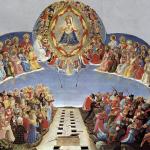 As we engage God, as we grow as a result of that engagement, our understanding and apprehension of the truth will grow. We will reflect upon what we learn, explore it and develop further our appreciation of the truth. Then, when we speak of it, we will do so in a new, improved form. It will approximative the absolute truth better while still being another form of relative truth. It will be greater than our previous exploration of the relative truth, even as it must be open to further development and growth as we encounter God once again. Our love for the truth leads us to do such reflection; it is a means by which we reach out to God and express the glory which we have received. It is a necessary part of our spiritual growth. Kataphatic theology is not useless: it reinforces our adherence to the truth which we have apprehended. It is good because the truth is good, and it leads us to desire even more of the truth, to act and react with the truth which we have apprehended so that we can receive the truth in a greater form and with it find ourselves receiving a greater share of the good.
As we engage God, as we grow as a result of that engagement, our understanding and apprehension of the truth will grow. We will reflect upon what we learn, explore it and develop further our appreciation of the truth. Then, when we speak of it, we will do so in a new, improved form. It will approximative the absolute truth better while still being another form of relative truth. It will be greater than our previous exploration of the relative truth, even as it must be open to further development and growth as we encounter God once again. Our love for the truth leads us to do such reflection; it is a means by which we reach out to God and express the glory which we have received. It is a necessary part of our spiritual growth. Kataphatic theology is not useless: it reinforces our adherence to the truth which we have apprehended. It is good because the truth is good, and it leads us to desire even more of the truth, to act and react with the truth which we have apprehended so that we can receive the truth in a greater form and with it find ourselves receiving a greater share of the good.
Kataphatic theology should always be open to an apophatic response. When we realize what we establish is a relative truth, we deny that relative when we compare it to the absolute truth in order to keep the absolute truly absolute. But we must not confuse our theological discourse, even when it is found in and through a higher form of analysis established through such apophaticism as leading to anything more than another form of kataphatic theology, another, hopefully greater form of relative truth. What we understand after all our engagement with apophatic theology will remain on the level of relative truth and so will not be the absolute. This, once again, is why Dionysius explained: But when making the predications and abstractions of things after It, we neither predicate, nor abstract from It; since the all-perfect and uniform Cause of all is both above every definition and the pre-eminence of Him, Who is absolutely freed from all, and beyond the whole, is also above every abstraction.
Apophatic theology, as a theological method, remains on the level of the intellect. God, the absolute truth, is not comprehended by either kataphatic or apophatic theology: God is beyond all such theology, all such discourse. Apophatic theology is important because it reminds us of the limits of any and all discourse concerning God, including and especially, apophatic discourses themselves. It proposes a method to purify our discourse, to establish a better, greater, relative presentation of the truth, but it will remain with kataphatic theology as a secondary reflection which is the result of our own engagement with God and the revelation which God has provided us.
The Mystical Theology can be seen as a presentation of the fact that no theological methodology will lead to a comprehension of God. Apophaticism is the means by which this is established, though it is established in such a way that the reader should realize that apophaticism itself is not the final answer. The text, therefore, also establishes the basis for our symbolic engagement with God, showing that such symbols have value, so long as we relativize them and realize no symbol itself is equal to the absolute truth. If apophaticism would be seen as all that the text was about, it would likely be found wanting. Rather, it is about finding the way in which we can approach God, to receive God in both kataphatic theology and apophatic theology while not limiting ourselves to any theological method to establish the truth itself. We give name to what we learn from God, but the names serve as relative representations of that truth. We deny the names, not because they are useless, but to make sure we do not get stuck in the names and get lost in secondary reflections of God and the truth when what we want is God and the truth itself. Likewise, the text also reminds us that not only is there a relative presentation of the truth, there is also falsehood, false representations of the truth which can be judged and denied thanks to the revelation of the truth given by God himself (in whatever form or level of revelation being discussed).
Apophatic theology serves us well when we use it to remind ourselves that the absolute truth God, is beyond mind, beyond thoughts, beyond all abstractions and all definitions which we give him. All of these are secondary representations of the truth depend upon the truth of God himself and they are true insofar as they remain united to that truth. As we must transcend the definitions and relative truth which predicate to God in our theological reflections, so we must transcend ourselves, our thoughts, and negate them in order to receive without interference the fullness of what we can apprehend from God in his revelation to us. Apophaticism, as a method, can be used to suggest that we should transcend theological reflection, and in this way, it serves as a foundation by which we learn the need to silence ourselves and our thoughts on God so we can then encounter God in himself as he exists beyond all such kataphatic and apophatic theology.
St. Edith Stein, understanding this being the point, wrote:
God is known only by revealing himself, and the spirits to whom he reveals himself pass on the revelation. Knowing and witnessing go together. But the higher the knowledge, the darker and more mysterious it is, the less it can be put into words. The ascent to God is an ascent into darkness and silence. [1]
Revelation will be received and reflected upon and transmitted to others thanks to our theological reflection. God reveals himself to us, but he also reveals himself to others. We can and should learn from others, even as we do from God. Different creatures, be it angels, humans, or others, will have different capacity to receive revelation from God, even as they will approach God in a different way and therefore reflect upon God coming from a different direction. Truth will not contradict truth, though how various relative truths work together and represent the ultimate truth might be beyond us: systematic theology, which tries to bring all such truths together and synthesize them, will remain invaluable as all katapahatic theology is, but it must also remain seen as a tertiary reflection on the truth which contains all kinds of assumptions and presumptions which can serve as the foundation for its own denial. As theological reflections should never be absolutized, so the means by which such systems bring together various relative truths with a hierarchy of truth assumed by the theologian, should likewise not be absolutized: no one theological system, no one philosophical system is absolute. Some will be better than others; but even then, usually there will be some apprehension and theological reflection that a “lesser” system will be able to engage in a more credible fashion than a “greater” system, which is why we must not presume a “lesser” system is in error if it disagrees with one which in general is “better.”[2]
We reflect, therefore, after our experience of God. The best form of theological reflection is talk about God after our encounter with God. It is, in this sense, a doxology, a glorification of God, not because God needs to be glorified, but because it opens us up even further to God and allows us to be that much more ready and desirous for the glory of God and his god-making grace in our lives. Our minds are a part of us; they are not made in vain; they are to serve us and our desire for the truth. This good can easily be subverted by us in our mind as we attach ourselves to the thoughts which we establish and reify them, which is how and why we end up absolutizing the relative truth and creating an idol which we address as God, putting forth our love and devotion to them instead of God, thereby leaving us infinitely far away from God as a result. Our desire for the truth is good. Our reflection on the truth is good. But it must always be treated as relative truth so that we do not end up judging the absolute on the basis of relative truth: to do so is to invert the hierarchy of truth, causing it to crash in upon itself.
[IMG=Christ with the Four Evangelists by Fra Bartolomeo [Public domain] via Wikimedia Commons]
[1] St. Edith Stein, “Ways to Know God” in Knowledge and Faith. Trans. Walter Redmond (Washington, DC: ICS Publications, 2000), 87.
[2] This means, for example, just because someone prefers Thomism to other theological systems, they cannot just respond to a theological argument “Thomas does not agree” as if that means the theological argument in question is refuted (and, likewise, in reverse; someone who prefers another theologian and their system cannot then denounce Thomas as being wrong just because Thomas disagree with their preferred theological reflection).
Stay in touch! Like A Little Bit of Nothing on Facebook













